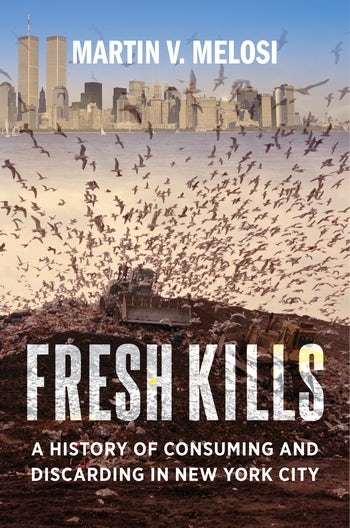
photo / Columbia University Press
The University of Houston’s Center for Public History is pleased to celebrate Cullen Professor Emeritus Dr. Martin Melosi’s reception of the 2021 John Brinckerhoff Jackson Prize for his most recent publication, Fresh Kills: A History of Consuming and Discarding in New York City (Columbia University Press, 2020). The book prize is a prestigious award given by the Foundation for Landscape Studies to works of original research within the field of landscape studies. Since 2007, the Foundation for Landscape Studies has evaluated published material within a three-year period of the award cycle and seeks to reward books that break ground in method and/ or interpretation of landscape studies scholarship. Melosi is a winning recipient among a diverse pool authors of with topics ranging from African American urban landscape history to biographical retrospectives.
A prolific author, Melosi has written and edited over nineteen books. Included among them are The Sanitary City: Environmental Services in America from Colonial Times to the Present; Atomic Age America; Effluent America: Cities, Industry, Energy, and the Environment, and Precious Commodity: Providing Water for America’s Cities. His most recent book, Fresh Kills, is testament to this long line of publications that reflect his dedication to the study of the urban environment.
Fresh Kills: A History of Consuming and Discarding in New York City is an impressive academic contribution that examines the history of Fresh Kills, a 2,200 square mile landfill located on Staten Island that was once the largest landfill in the world. Diving into the environmental and social impact of the dumping site, Melosi chronicles the pre-history of Staten Island in the 18th and 19th centuries, the lifespan of the landfill (1948-2001), and its ongoing transformation into what will become a behemoth-sized greenspace and park. Melosi’s history of Fresh Kills is divided into six parts and twenty chapters, fitting for a work tackling such a long and complex history.
Throughout the different sections, Melosi details New York City’s complicated relationship with the environment, the handling of consumption and waste management, and the subsequent social and political implications. Frustrated and overwhelmed with its own garbage problems, New York City in the twentieth century oscillated back and forth between various incineration strategies, ocean dumping, and unloading the trash onto “other,” historically less-desirable land areas – which included Staten Island’s marshland. The resulting struggle between political leaders, environmental activists, and other “not-in-my-backyard,” anti-dumping objectors provides the dramatic tension that drives the history forward.
Given the tumultuous history of the enormous landfill, one of Melosi’s concerns with the conversion of the site into an enormous recreation area and a park is that history of conflict over New York’s consumption and waste not be forgotten or buried like so much garbage. The use of Fresh Kills as a burial site for human remains and World Trade Center wreckage after the events of 9/11, as well as the debris caused by Hurricane Sandy, means that the grounds cannot simply be reconverted “back to nature.” Fresh Kills is forever bound up with human tragedy and loss, and Melosi’s history raises profound questions about how we grapple with those realities and how we choose to remember them.
Receiving the John Brinckerhoff Jackson Prize is a testament to Dr. Melosi’s dedication to environmental history, his care for the complexities of waste management, and his awareness of the responsibility consumerist societies bear when it comes to their garbage. The book is an invaluable resource for urban and environmental historians, as well as those interested in the inner workings of New York’s economic, ethnic, and social gears.
To find your copy of Fresh Kills you can click the link here. For more information about Dr. Melosi and his academic work, access his faculty page here. To find out more about the Department of History at the University of Houston, please visit their website.